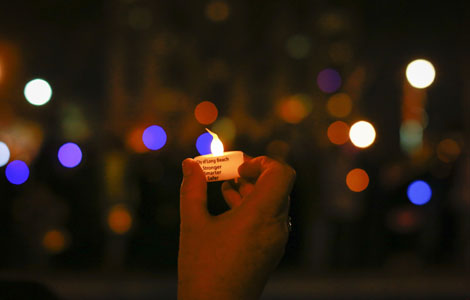Tian'anmen jeep crash a terror attack
Updated: 2013-10-31 00:58
By Cui Jia in Urumqi (China Daily)
|
|||||||||||
Incident indicates extremists are spreading outside Xinjiang: Experts
Terrorist attacks carried out by extremists from the Xinjiang Uygur autonomous region have spread outside the region and become more difficult to prevent, experts said on Wednesday after police identified Monday's deadly crash at Beijing's Tian'anmen Square as a terrorist attack.
Usmen Hasan, with his mother Kuwanhan Reyim and his wife Gulkiz Gini on board, drove a jeep with a Xinjiang license plate into a crowd of people at noon on Monday, killing two and injuring another 40.
"The attack was carefully planned, organized and premeditated," a spokesman for the Beijing Public Security Bureau said on Wednesday.
The jeep crashed into a guardrail on Jinshui Bridge across the moat of the Forbidden City. All three in the jeep died after they set gasoline stored in containers inside the vehicle on fire.
Police found gasoline, two knives and steel rods as well as a flag with extremist religious content in the jeep, Xinhua reported.
"It is an obvious suicide attack. It is also the first time that a family has been involved in carrying out a terrorist attack," said Ma Pinyan, a senior anti-terrorism researcher and deputy director of the ethnic and religious study center at the Xinjiang Academy of Social Sciences in Urumqi, capital of the region.
Two of the attackers were women and they were carrying a flag of an extremist religion, "which shows that the whole family was under the strong influence of extremist religion, which has led to an increasing number of attacks in Xinjiang in recent years", he said.
Suicide attacks have been seen in many terrorist incidents in Xinjiang since 2008, he added.
People often believe such attacks only happen in Xinjiang, especially the southern part of the autonomous region, such as Kashgar and Hotan.
But a violent terrorist attack on June 26 in Lukqun, eastern Xinjiang's Turpan prefecture that resulted in 35 deaths indicated that the location of attacks has become more random, he said.
"This time the attackers targeted Tian'anmen, the heart of China's capital and the country's political center, because they want to generate a greater sense of fear and international impact. People should realize that terrorist attacks are not something peculiar to Xinjiang," Ma said.
Li Wei, director of the anti-terrorism research center under the China Institutes of Contemporary International Relations, said Monday's terrorist attack was launched in a similar way to the one in Kashgar on July 30, 2011, when terrorists drove a vehicle into a crowd in Kashgar city, killing eight people.
Li said the best way to prevent such terrorist attacks is to increase intelligence efforts and find signs of a planned attack in advance.
But the fact that the three suspects are from the same family shows that terrorists are launching attacks in family units, which makes it difficult for police to detect.
Ma said that most of the recent attacks were planned by groups of people brainwashed by extreme religion rather than terrorist organizations, which are more hidden.
"Effectively curbing the spread of extreme religion in Xinjiang, which is the source of the problem, remains a challenge for authorities in the region as well as the central government," he said.
About 10 hours after the attack at Tian'anmen Square, Beijing police captured five suspects with the cooperation of police authorities including those in Xinjiang.
Police also found knives and at least one "jihad" flag in the temporary residence of the detained suspects, who admitted that they knew Usmen Hasan and conspired to plan and carry out the attack, according to Xinhua.
It's still unknown where the suspects were detained and which parts of the region they are from.
Meanwhile, the government has urged all-out efforts to save the lives of the injured in Monday's attack, a quick search for the truth behind the incident and strong measures to guarantee the safety and stability of the capital city.
The injured are being treated at nearby hospitals. Some have undergone surgery and other emergency treatment.
Foreign Ministry spokeswoman Hua Chunying said on Wednesday that China expressed condolences to the victims, pledging to provide necessary assistance to the countries concerned.
Police said a female Filipino tourist and a male tourist from Guangdong province were killed in the attack.
The injured include three tourists from the Philippines and a male tourist from Japan.
Xu Wei in Beijing and Xinhua contributed to this story.
Related Stories
Chinese FM responds to Tian'anmen car crash 2013-10-30 20:58
Xinjiang bid to curb terrorist attacks 2013-10-09 07:16
Govt to boost Xinjiang region 2013-09-25 07:44
3 sentenced to death for Xinjiang terror attack 2013-09-13 07:11
Today's Top News
Visit heralds closer Sino-EU trade ties
Tian'anmen jeep crash a terror attack
Chinese cities victim of US spying
Legislation speeded up to reduce pollution
Govt pledges more affordable housing
Halloween gaining popularity in China
A bumpy road for environmental courts
FTZ to be template for change
Hot Topics
Lunar probe , China growth forecasts, Emission rules get tougher, China seen through 'colored lens', International board,
Editor's Picks

|

|

|

|

|

|





